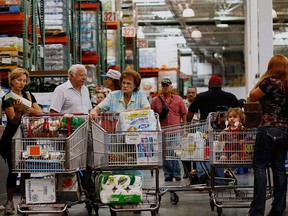Ottawa ‘actively assessing’ whether new measures needed in light of variant, Freeland’s office says
Article content
Small businesses and restaurants in Canada are calling for more government support as fresh restrictions now being imposed to battle the Omicron variant of COVID-19 severely restrict their trade and new “incredibly limited” aid programs fall short.
Advertisement
This advertisement has not loaded yet, but your article continues below.
Article content
In an open letter to Canadian premiers Tuesday the Canadian Federation of Independent Business and Restaurants Canada pleaded for immediate help.
“Put frankly, tens of thousands of small firms across Canada will receive no support from governments while government restrictions dramatically reduce their ability to serve customers and public health warnings frighten many consumers into staying home,” the groups said.
In a statement late Tuesday, a spokesperson for Finance Minister Chrystia Freeland’s office said the federal government is considering possible changes to support measures due to Omicron.
“In light of the public health situation and new restrictions in a number of provinces, we are actively assessing if regulatory adjustments are needed to provide additional flexibility for the support measures contained in Bill C-2,” the statement said.
Advertisement
This advertisement has not loaded yet, but your article continues below.
Article content
Most provinces have now announced further capacity limits to restaurants and businesses; even in those that haven’t, nervous consumers are cancelling reservations and going back to shopping online, the letter said.
Ontario has limited indoor settings to 50 per cent capacity, including shops and restaurants. Bars and restaurants must close at 11 p.m., with the exception of take-out and delivery service. Quebec has shut down bars, casinos, theatres and gyms. Restaurants can serve at 50 per cent capacity during limited hours . On Tuesday, Nova Scotia added similar restrictions on dining and gym capacity.
Olivier Bourbeau, vIce-président of Quebec and federal affairs at Restaurants Canada, said prior to the release of the Federal Government’s statement that he doesn’t think Ottawa will make it easier to qualify for aid.
“We have been asking the Federal (government) to do so,” he said, including seeking to move the threshold back to the 10 per cent that was in place for earlier wage and rent subsidies.
“But they stick to their 40 per cent,” Bourbeau said.
“CFIB and Restaurants Canada also reached out to all Premiers to support us in that demand,” he added.
He said the organization is also asking that a Lockdown Support Program apply not only when businesses are fully closed, but with the current capacity limits in place in many provinces including British Columbia, Manitoba and Ontario.
Advertisement
This advertisement has not loaded yet, but your article continues below.
Article content
Even before the Omicron outbreak, the sales of almost two-thirds of small businesses had not returned to normal, CFIB says. A quarter of those said their businesses could fail within the next six months.
Government support programs, including those announced last week by Deputy Prime Minister Chrystia Freeland, are restricted to the hardest hit and don’t fill all the gaps, according to the industry groups and those who work closely with the hospitality industry.
Help from Ottawa is now “incredibly limited,” the CFIB said, noting that data — even before Omicron — showed that 80 per cent of the small businesses that need help no longer qualify for aid.
Advertisement
This advertisement has not loaded yet, but your article continues below.
Article content
Under Ottawa’s new programs, a restaurant that has lost 35 per cent of its revenue, and a retailer that has lost 45 per cent, will no longer receive support, according to the open letter.
Federal “lockdown” support is only available to businesses which have been almost completely shut down. If the business has had to restrict operations to 50 per cent, it is ineligible.
“More help is certainly needed as the current criteria for eligibility disqualify many restaurants,” said Chad Finkelstein, a lawyer whose practice at Dale & Lessmann LLP in Toronto is heavily focused on the restaurant industry.
“When restrictions were previously lifted, many restaurants saw a few months of sales growth that now — in a sad, ironic twist — disqualify them from most support programs as a result,” he said.
Advertisement
This advertisement has not loaded yet, but your article continues below.
Article content
Dan Kelly, head of the CFIB, told the Canadian Press that businesses are likely to have burned through reserves or cushions built up in periods when restrictions were loosened.
“Any little glimmer of hope that many businesses saw at the end of this two-year tunnel is quickly being extinguished,” he told the Canadian Press.
The CFIB letter calls for the premiers to introduce a new round of provincial small business grants. They also asked the provinces to urge Ottawa to:
- Return wage and rent subsidies to spring of 2021 levels
- Revise extra lockdown supports so that businesses facing partial restrictions are included
- Reopen the Canada Emergency Business Account (CEBA) loan program with a larger loan, a larger forgivable portion and delayed repayment requirements
- Ensure that new firms can qualify for all programs
Advertisement
This advertisement has not loaded yet, but your article continues below.
Restaurants plead for help as Omicron threatens to take devastating toll
2021-12-22 01:08:14






